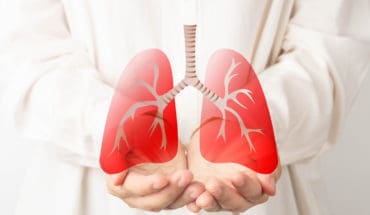Idiopathic Pulmonary Fibrosis (IPF) is a devastating disease which occurs when tissue deep inside the lungs becomes thick and scarred. This scarring, known a fibrosis, makes it harder to breathe and get sufficient oxygen into the bloodstream. Although there is a great deal which we don’t know about it, including the reason why it happens, we do have evidence that it is becoming more common. Our research at the British Lung Foundation suggests that around 32,500 people are living with the condition in the UK.
During IPF week, we are keen to raise awareness about the disease and acknowledge advances that have already been made to find treatments. However, we also want to highlight how much still needs to be done in terms of funding research to improve diagnosis, develop better treatments and improve quality of life for people living with this disease.
Diagnosing IPF is complex and at the moment, many people with IPF are diagnosed when their disease is advanced. Average life expectancy after diagnosis is around three years. Lung transplants are an option for some patients but depend on many things such as availability of a suitable organ and the health of the patient.
Delayed diagnosis is not surprising since this type of interstitial lung disease has symptoms which can easily be confused with other lung conditions, including shortness of breath on exertion and coughing. Family doctors play an important role in referring patients to a multidisciplinary team for investigation and diagnosis, but GPs may see very few cases each year and may not consider IPF as a possibility. Education and awareness campaigns could help front line healthcare professionals recognise the symptoms of IPF and refer the patient on to a team of specialists who can diagnose the condition as soon as possible and start treatment. Simpler ways to confirm diagnosis would also help.
Evidence suggests that IPF happens when the cells that line the alveoli (the tiny air sacs) in the lungs are damaged in some way and the healing process goes out of control. But we still just have theories about what causes this process to start, usually in middle age. For example, it could be smoking (the condition is more common in smokers and ex-smokers), viral infections or acid reflux, to name a few potential causes.
We know that fibroblasts are the cells that lay down the excess scar tissue and white blood cells in the lungs also seem to play a role in the process of fibrosis, but many questions remain about what role these cells play in the condition. If we can gain a better understanding of the specifics, we will get closer to more effective treatments, or even a cure.
Closer ties between research bodies and scientists who are trying to find the answers is already bringing that day closer. Over the last 10 years, there has been greater collaboration between research groups at the University of Southampton, Imperial College London and the University of Nottingham, as well as other centres.
Five years ago, there were no effective treatments for IPF available in the UK, but there are now new drugs which can help to reduce the progression of the disease. These medicines include pirfenidone and nintedanib. However, they don’t work for everyone and can have side effects. BLF are currently funding research at Newcastle University to look into whether people with IPF who have acid reflux controlled with a medication called omeprazole have better outcomes than those who don’t. Ultimately, this work may lead to another new treatment for IPF.
We have also funded pre-clinical research at the University of Southampton to see if a drug licensed for treating cancer may help to control scar formation and the results look promising. At the moment researchers have looked at cells in the lab, but if this work can be successfully translated into humans, because it is an existing drug, the time to getting the drug available in the clinic would be much shorter than for a brand new drug.
So, we are definitely going in the right direction. With the right support and funding in place, there is every chance we can beat this disease.
IPF Week is between 17-25 September. Further information: www.blf.org.uk/ipfweek
- COPD – getting the best out of treatments - 15th November 2016
- Cure for IPF – a real hope - 20th September 2016






